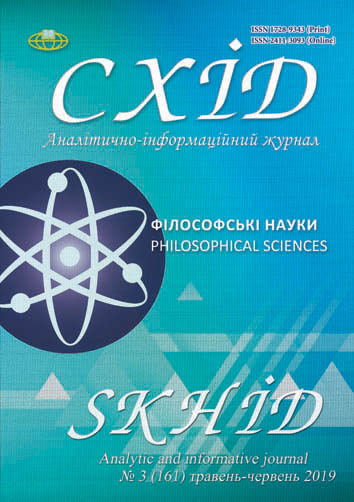Philosophy of religion in Ukrainian and Western science
DOI:
https://doi.org/10.21847/1728-9343.2019.3(161).171896Keywords:
philosophy of religion, religious studies, religion, God’s existence, attributes of God, theology, problem of God’s existence.Abstract
Philosophy of religion is one of the most popular philosophical disciplines at Western and American universities. The concept “philosophy of religion” is also presented in Ukrainian educational system. Nevertheless the essence of the concept in Ukrainian and Western scientific environment is not identical. The exploration of the differences constitutes the relevance of the issue. The main research method is comparative analysis: the work is based on textbooks’ analysis from philosophy of religion written in the West in comparison to the national works of religious studies. The main pioneering result reached in the issue is to highlight the conceptual differences of “philosophy of religion” in Ukrainian and Western scientific traditions. In Ukraine philosophy of religion is a philosophic discipline that studies a phenomenon of religion, as in Western and American scientific environment the subject of philosophy of religion is God. The presented difference in approaches depends on the difference of ideological bases. Soviet science of religious studies which dominated in Ukraine for the decades and has still remained impact on the most part of scientific environment was built on Marxist atheism and considered religion not according to human interrelationships with the Highest Being, but as a result of social relationships. In other words religion is a social phenomenon for Marxist religious studies, namely social generated reality. In the West, where philosophy of religion has never been in service to totalitarian ideology, God has remained a subject of the discipline. Western philosophy of religion is close to theology owing to the subject of study which is also explores God. The difference between them is in the research method: philosophy of religion explores God via intelligence, and theology via revelation. Western challenges of philosophy of religion are to explore God via human intelligence. The European tradition endeavors to separate knowledge about God that can be explored by human mind from the knowledge which is presented to human via revelation.Downloads
References
Bayne, T. (2018). Philosophy of Religion: A Very Short Introduction. Oxford: Oxford University Press, 137 p. DOI: 10.1093/actrade/9780198754961.001.0001 (In English)
Borozovets, Т. А. and Havryliuk, Т. V. (2013). Relihieznavstvo: navchalnyj posibnyk. Kyiv, 2013. 185 p. (In Ukrainian)
Brabant, C., Boeve, L. (Ed.). (2010). Between Philosophy and Theology. London: Routledge. DOI: https://doi.org/10.4324/9781315261676 (In English)
Brodetskyy, O. Ye. (2008). Filosofiya relihiyi. Chernivtsi: Ruta, 80 p. (In Ukrainian)
Caputo, J. D. (2006). Philosophy and Theology. Abington Press, 84 p. (In English)
Drotyanko, L. H., Matyukhina, O. A., Ishchuk, N. V. (2004). Relihiyeznavstvo: navchalnyy posibnyk z khrestomatiyeyu. Kyiv: National Aviation University, 150 p. (In Ukrainian)
Filosofiya relihiyi (2002). Filosofskyy entsyklopedychnyy slovnyk. Kyiv: Abrys. 742 p. (In Ukrainian)
Filosofiya relihiyi. In: Velyka ukrayinska entsyklopediya. Retrieved from https://vue.gov.ua/Філософія_релігії (In Ukrainian)
Kyselev, O. and Khromets, V. (2012). Fylosofyya relyhyy: dystsyplyna, teoriya ili podkhod v relihiovedenii? Filosofska dumka. SENTENTIAE. Special Issue II (2011): Teolohiya i filosofiya relihiyi. Vinnytsya: VNTU, Pp. 142-149. Retrieved from https://religious.life/2013/01/philosophy-of-religion/ (In Russian)
Leshan, V. Yu. (2005). Osnovy relihiyeznavstva. Chernivtsi: Ruta, 2005. 304 p. (In Ukrainian)
Löffler, W. (2007). Einführung in die Religionsphilosophie. Zeitschrift für Religions- und Geistesgeschichte, 59(4), 381. DOI: https://doi.org/10.1163/157007307781787606 (In English)
Meister, C. (2009). Introducing Philosophy of Religion. London, DOI: https://doi.org/10.4324/9780203880029 (In English)
Merklinger, Ph. M. (1992). Philosophy, Theology, and Hegel's Berlin Philosophy of Religion, 1821-1827. State University of New York Press, 251 p. (In English)
Mondin, B. (2012). Filosofiya relihiyi i teodytseya: pidruchnyk (tranlat. from Italian). Zhovkva: Misioner, 205 p. (In Ukrainian)
Murray, M., & Rea, M. (2008). An Introduction to the Philosophy of Religion (Cambridge Introductions to Philosophy). Cambridge: Cambridge University Press. DOI: https://doi.org/10.1017/CBO9780511801488 (In English)
Oppy, G. and Scott, M. (2010). Reading Philosophy of Religion. Selected Texts with Interactive Commentary. Oxford: Wiley-Blackwell. (In English)
Popov, M. V. (2007). Filosofiya relihiyi: navchalnyy posibnyk. Kyiv: Askaniya, 313 p. (In Ukrainian)
Taliaferro, Ch. and Marty, E. J. (2010). A Dictionary of Philosophy of Religion. New York, London: Continuum, 285 p. (In English)
Zagzebski, Linda (2005). Morality and Religion. In: William J. Wainwright (ed.) The Oxford Handbook of Philosophy of Religion. Oxford: Oxford Scholarship Online. DOI: https://dx.doi.org/10.1093/0195138090.003.0015 (In English)
Downloads
Published
How to Cite
Issue
Section
License
Copyright (c) 2019 Oleh Shepetiak

This work is licensed under a Creative Commons Attribution-NonCommercial-NoDerivatives 4.0 International License.
1. Authors bear responsibility for the accuracy of facts, quotations, numbers and names used.
2. Manuscripts are not sent back.
3. The publisher does not always agree with the authors' opinion.
4. The authors reserve the right to authorship of the work and pass the first publication right of this work to the journal under the terms of a Creative Commons Attribution-NonCommercial-NoDerivatives 4.0 International License. This license allows others to distribute (copy) the published work for non-commercial purposes, provided there is mandatory attribution to its authors and a link to the first publication in our journal.
5. The authors have the right to conclude separate supplement agreements that relate to non-exclusive work distribution in the form in which it has been published by the journal (for example, to upload the work to the online storage of the journal or publish it as part of a monograph), provided that the reference to the first publication of the work in this journal is included.

